Finding the right CRM solution is crucial for sales and marketing teams, especially when managing sales pipelines, automating workflows, and analyzing customer data. While HubSpot CRM is a popular choice, businesses often explore other options due to its steep learning curve, pricing, or specific business needs. For teams looking for an alternative to HubSpot, whether it’s a more affordable CRM, advanced marketing automation tools, or a simpler user interface, there are plenty of options that cater to small businesses, sales teams, and marketing teams alike.
In this guide, we’ll explore the top HubSpot CRM alternatives. We’ll break down their key features, pricing, and how they support various business processes, like task management, customer support, and sales automation. Whether you need marketing automation software for crafting personalized email marketing campaigns or tools to streamline your sales process, there’s an option to meet your goals.
Keep reading to find the best CRM tools for your team, and discover how these platforms can improve your customer journey, automate repetitive tasks, and simplify sales funnel management.
Criteria for Evaluation
Choosing the right CRM software involves more than just comparing features. Different businesses have unique business needs, so it’s essential to evaluate platforms based on what aligns with your goals. Here are the key factors to consider when looking for an alternative to HubSpot:
1. Automation Features
Look for robust marketing automation and sales automation tools that can handle email marketing, task management, and sales pipeline management. Platforms with advanced automation can help your team focus on strategy by automating repetitive tasks like follow-ups and lead scoring.
2. Ease of Use
A CRM solution should have an intuitive interface that is easy to navigate for both sales and marketing teams. Tools with drag-and-drop functionality or customizable templates can simplify the customer journey and reduce the learning curve.
3. Integration Capabilities
Ensure the CRM integrates seamlessly with tools you already use, such as email marketing tools, social media marketing platforms, and event management software. Strong integration options allow you to access customer data and insights in one place, enhancing workflow efficiency.
4. Affordability and Pricing
For SMBs and small businesses, cost is often a deciding factor. Look for CRMs that offer a free plan or free trial, as well as scalable pricing options to match your growth. An affordable CRM should still include the key features needed for managing sales pipelines and marketing campaigns.
5. Customer Support
Reliable customer support is essential, especially during setup and customization. Consider platforms that offer 24/7 assistance, dedicated account managers, and comprehensive documentation to help your team get the most out of the tool.
6. Reporting and Analytics Features
Your CRM should provide detailed insights into customer behavior, sales forecasting, and campaign performance. Access to advanced reporting tools ensures your sales teams manage leads and processes effectively while staying data-driven.
Top 11 HubSpot Alternatives
1. Desku
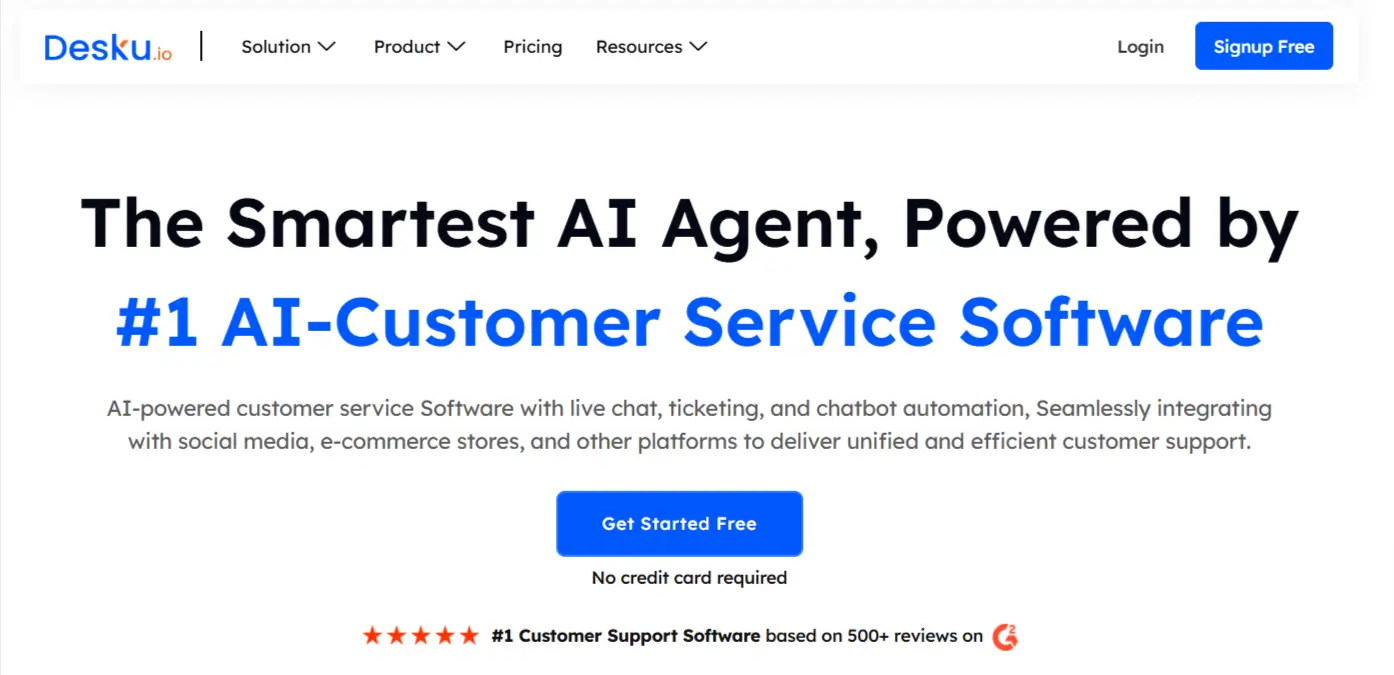
Desku is an emerging customer support platform designed to simplify business processes and improve customer satisfaction. It combines sales pipeline management, automation features, and powerful task management tools into one user-friendly platform.
Key Features:
- Seamless workflow automation for sales and marketing teams.
- Tools to automate repetitive tasks and manage customer interactions.
- A robust ticketing system for efficient customer support.
- Customizable dashboards to access key customer data at a glance.
- Integration capabilities to connect with popular marketing tools.
Pricing:
Desku offers affordable plans with a free trial, making it ideal for small businesses and teams looking for an affordable CRM with all the features needed for customer support.
Best For:
- Customer support managers and teams.
- Businesses looking for a great HubSpot CRM alternative focused on service.
- Teams aiming to combine automation features with a clean user interface.
Why Choose Desku?
With its advanced tools for task management and automated workflows, Desku helps businesses streamline operations and enhance the customer journey, making it a strong competitor among HubSpot CRM alternatives.
2. Zoho CRM

Zoho CRM is one of the most popular HubSpot competitors, known for its versatility and affordability. It offers a wide range of features tailored to small businesses and growing sales and marketing teams.
Key Features:
- Comprehensive contact management for tracking and managing leads.
- Advanced marketing automation tools for running targeted campaigns.
- AI-powered insights for sales forecasting and analysis.
- Tools for email marketing automation and personalization.
Pricing:
Zoho CRM offers a free plan for small teams and scalable pricing for larger businesses.
Best For:
- Marketing teams and sales teams.
- Businesses seeking a flexible and affordable CRM.
- Teams requiring strong reporting and analytics features.
Why Choose Zoho CRM?
Zoho CRM stands out for its automation features and ease of integration with other Zoho apps, making it a reliable choice for businesses of all sizes.
3. Pipedrive

Pipedrive is a CRM solution built for sales teams manage leads and optimize the sales process. Its focus on visual sales pipelines and automation makes it a favorite for businesses looking to enhance productivity.
Key Features:
- Easy-to-use drag-and-drop interface for pipeline management.
- Automation features for task reminders, follow-ups, and lead progression.
- Built-in sales analytics and forecasting tools.
- Seamless integrations with email marketing tools and other software.
Pricing:
Pipedrive offers scalable pricing options with a free trial for new users, making it suitable for businesses at different stages of growth.
Best For:
- Teams focused on sales funnel optimization.
- Businesses needing reporting and analytics features.
- Organizations looking for a highly visual CRM with simple workflows.
Why Choose Pipedrive?
With its focus on simplicity and productivity, Pipedrive is an excellent choice for sales teams aiming to improve efficiency while maintaining a user-friendly experience.
4. Freshsales
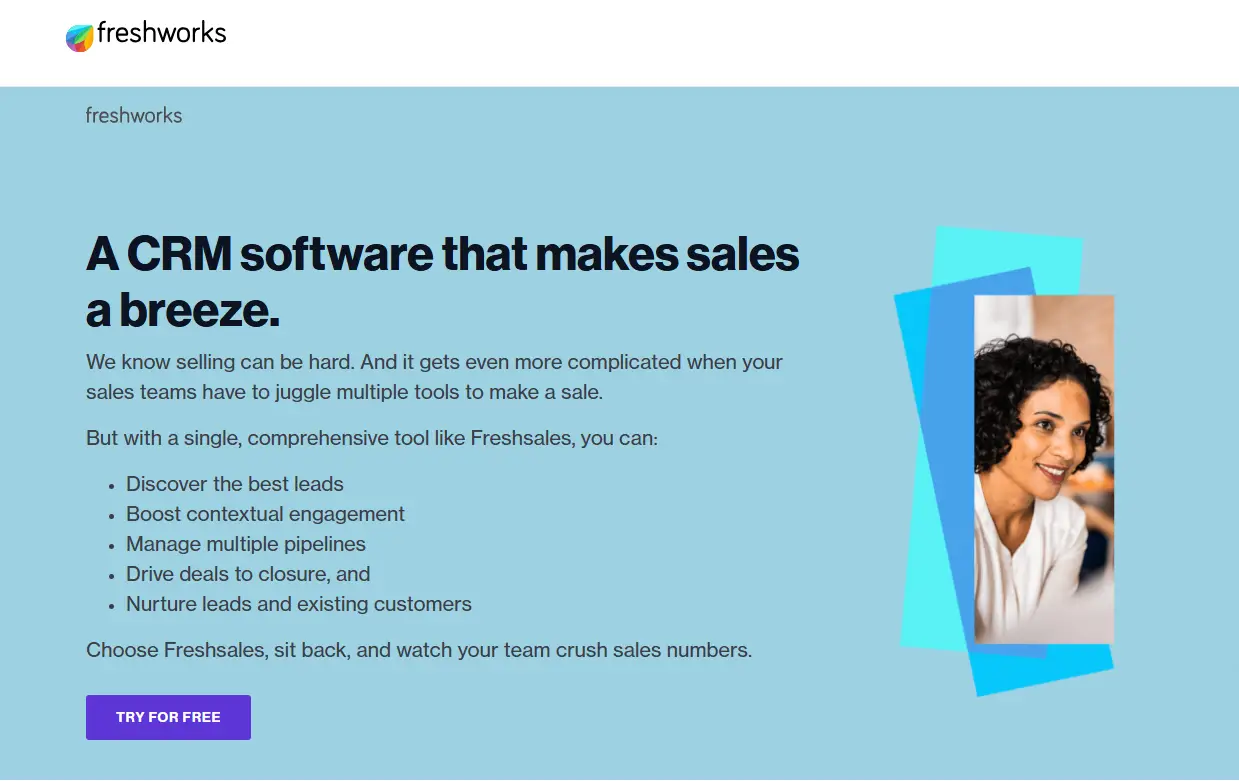
Freshsales, part of the Freshworks suite, offers a comprehensive CRM solution with tools for sales and marketing teams. Its AI-driven features help businesses analyze customer behavior and automate outreach.
Key Features:
- AI-powered lead scoring and deal insights.
- Tools to automate email marketing and track engagement.
- Advanced workflow automation for managing sales pipelines.
- Built-in chat and phone features for customer communication.
Pricing:
Freshsales provides a free plan for small teams and competitive pricing for advanced features.
Best For:
- Businesses focused on AI-driven sales automation.
- Teams seeking an intuitive interface with integrated communication tools.
- Companies wanting a scalable solution that grows with their business needs.
Why Choose Freshsales?
Freshsales is ideal for teams that want to leverage AI for better decision-making and automate repetitive tasks, making it a top choice among HubSpot competitors.
5. Salesforce Essentials
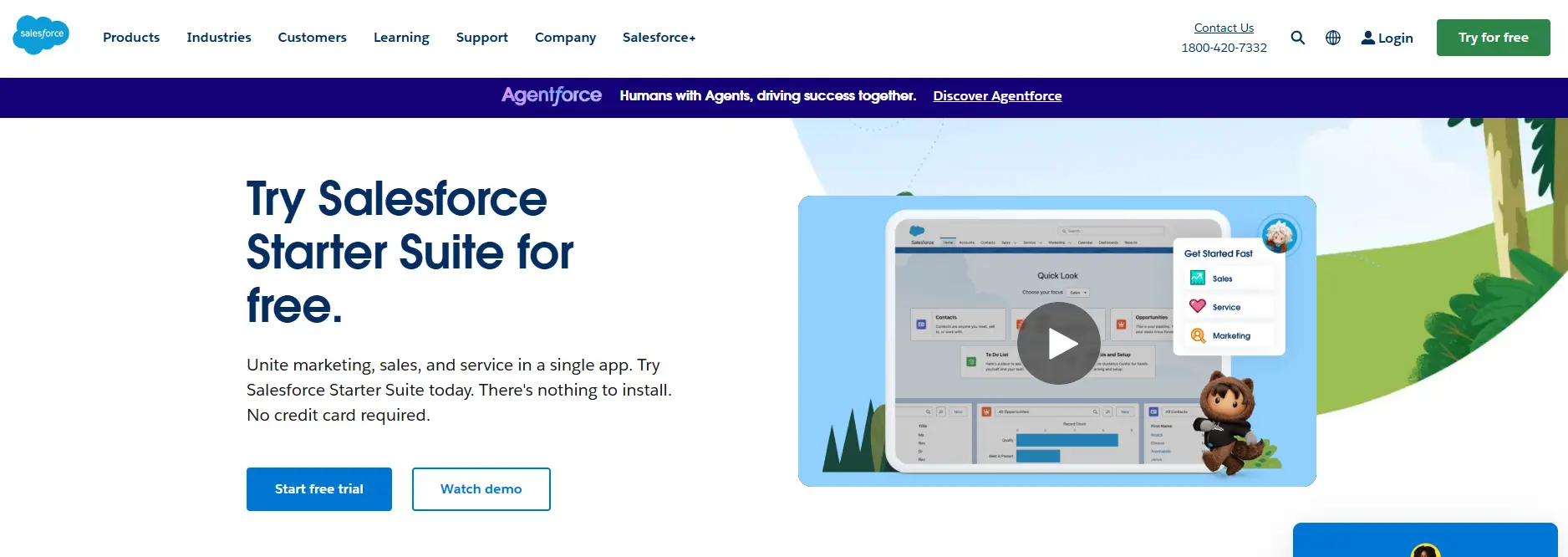
Salesforce Essentials offers the power of Salesforce tailored to small businesses. Known for its scalability and advanced automation features, it’s a strong contender for businesses wanting to streamline their sales process.
Key Features:
- Sophisticated tools for customer segmentation and tracking.
- Customizable dashboards to access customer data in real-time.
- Tools for creating and managing marketing campaigns.
- Advanced reporting tools and sales analytics.
Pricing:
Salesforce Essentials starts at an affordable price point, with scalable options for growing businesses.
Best For:
- Small to medium-sized businesses requiring a scalable CRM solution.
- Teams needing powerful reporting and analytics features.
- Businesses looking for a feature-rich platform with automation features.
Why Choose Salesforce Essentials?
Salesforce Essentials combines the reliability of Salesforce with the flexibility that small businesses need, making it a trusted option for teams scaling their operations.
6. Insightly
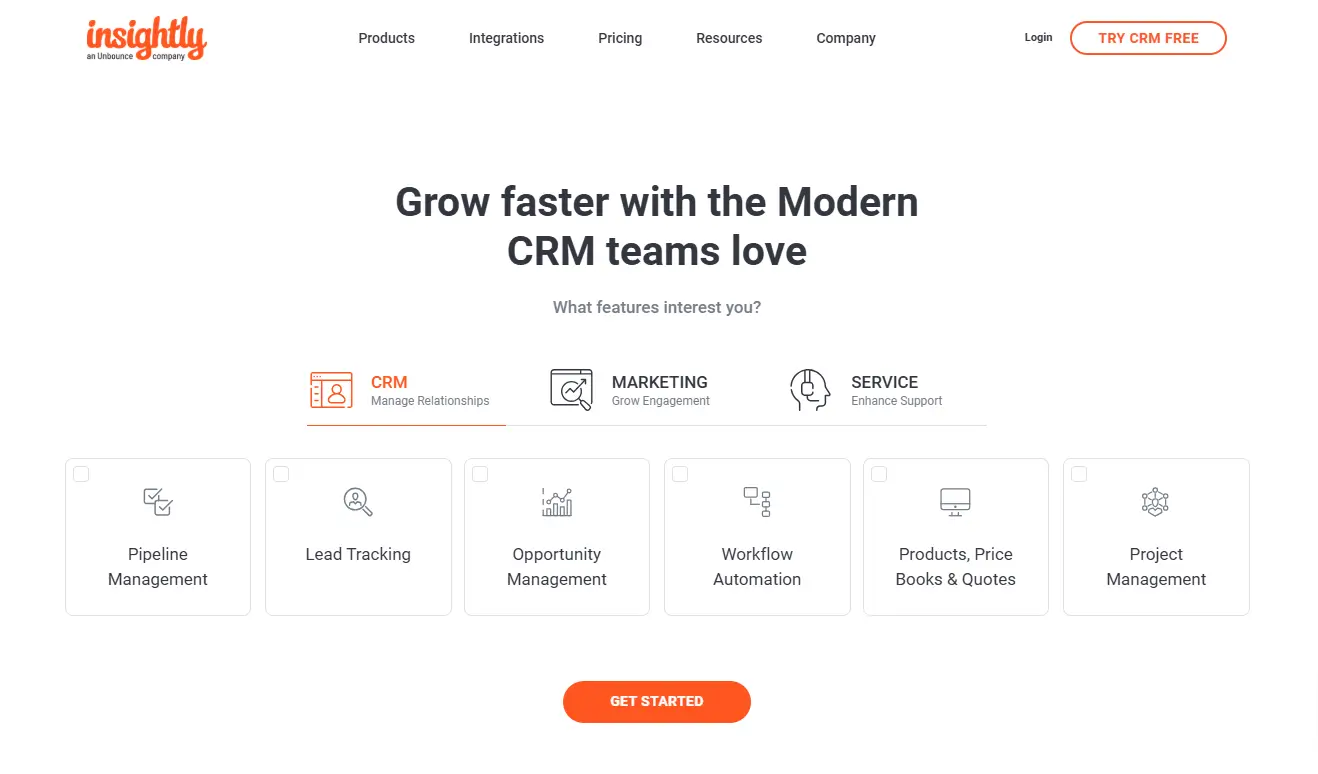
Insightly is a CRM solution designed for businesses looking to manage both sales pipelines and marketing campaigns in one platform. Its emphasis on project management and collaboration makes it stand out.
Key Features:
- Unified platform for sales teams manage leads and projects.
- Tools for email marketing automation and tracking.
- Customizable workflows to automate repetitive tasks.
- Integration with popular apps for enhanced functionality.
Pricing:
Insightly offers competitive pricing with a free trial, making it accessible for businesses of all sizes.
Best For:
- Teams that need a blend of sales pipeline management and project tracking.
- Small businesses looking for a simple yet powerful CRM solution.
- Businesses focused on aligning sales and marketing teams.
Why Choose Insightly?
Insightly is perfect for teams seeking a platform that combines task management and workflow automation with robust project tracking tools.
7. Monday Sales CRM
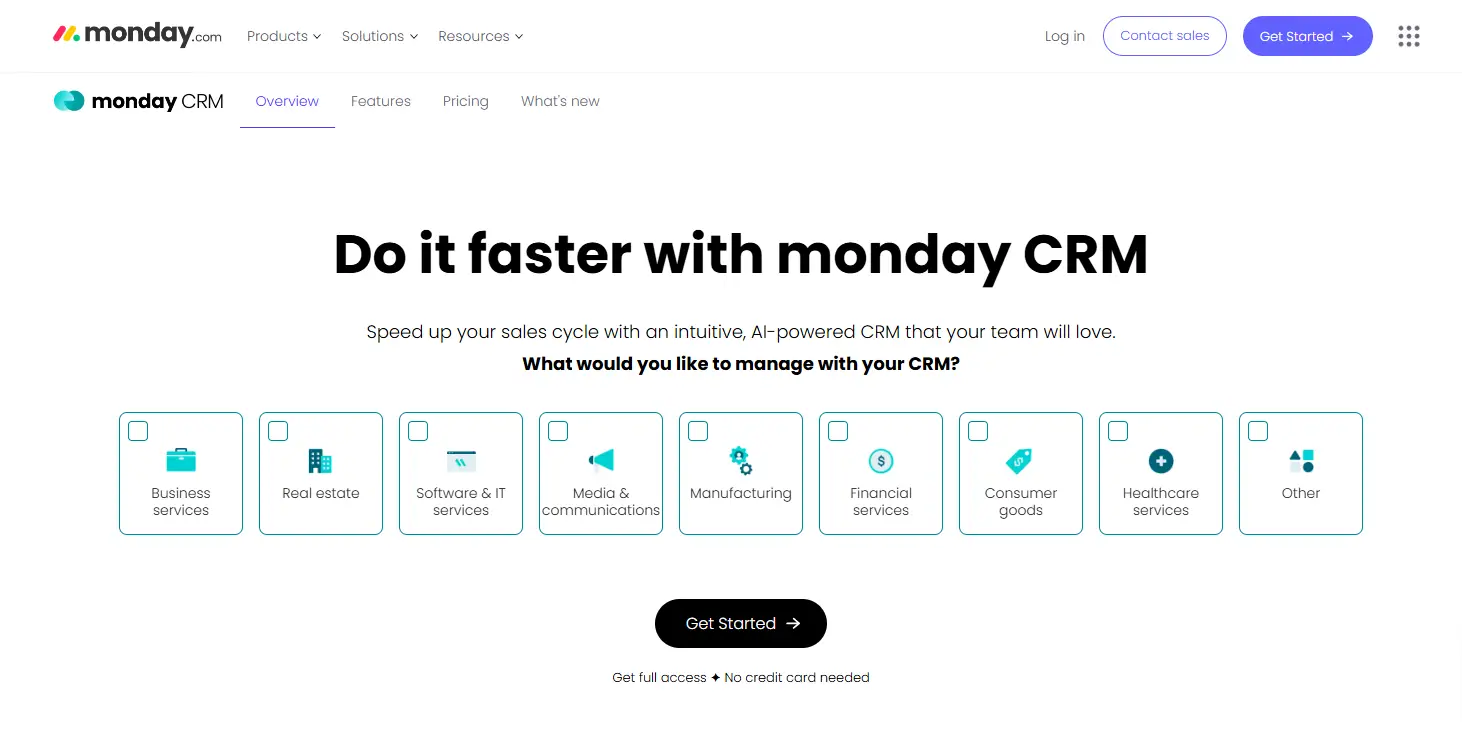
Monday Sales CRM, part of the Monday.com suite, is known for its visual approach to managing sales pipelines and marketing tasks. Its flexibility makes it ideal for sales and marketing teams looking for a highly customizable solution.
Key Features:
- Visual dashboards with drag-and-drop customization.
- Tools for managing customer behavior and sales pipelines.
- Automation features to streamline task management and workflows.
- Integration with tools for social media marketing and email marketing.
Pricing:
Monday Sales CRM offers a range of pricing plans with a free trial to get started.
Best For:
- Teams seeking a visually appealing and customizable platform.
- Businesses needing a tool for both sales process and marketing tasks.
- Organizations looking to automate email marketing and manage customer data efficiently.
Why Choose Monday Sales CRM?
With its visual approach and flexible tools, Monday Sales CRM is a great choice for teams that value customization and intuitive design.
8. Keap (formerly Infusionsoft)
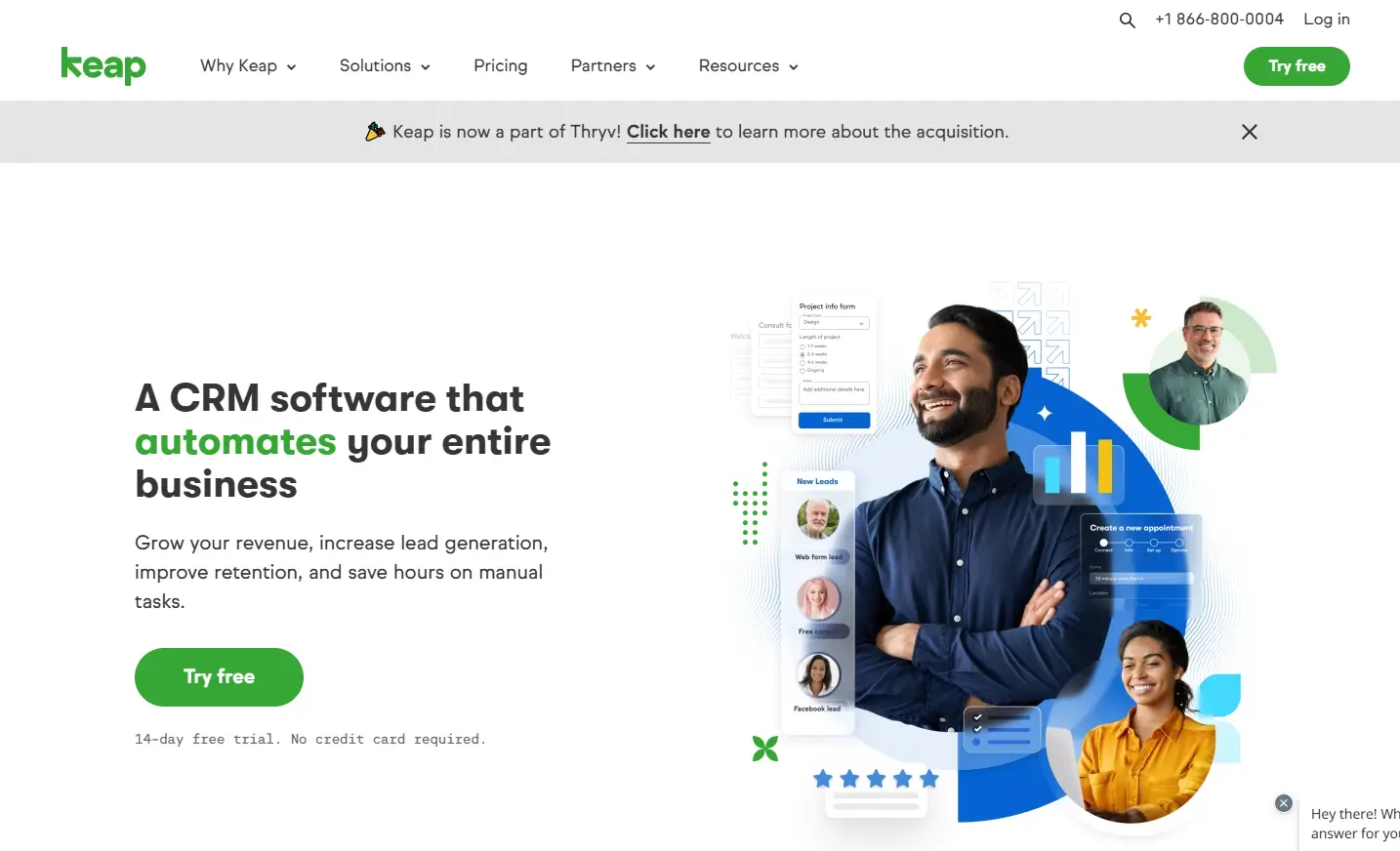
Keap focuses on simplifying marketing automation and sales automation for small businesses. It’s designed to help businesses build strong customer relationships through automated workflows.
Key Features:
- Comprehensive email marketing automation tools.
- Integrated sales pipeline management for leads and deals.
- Tools to automate repetitive tasks like follow-ups and reminders.
- Built-in payment and invoicing features for streamlined processes.
Pricing:
Keap offers scalable plans, starting with a free trial for new users.
Best For:
- Small businesses looking for an affordable CRM with robust automation.
- Teams focused on building personalized marketing campaigns.
- Businesses needing task management and invoicing features in one platform.
Why Choose Keap?
Keap’s focus on automation features and simplicity makes it a top choice for businesses wanting to streamline business processes and improve customer satisfaction.
9. ActiveCampaign
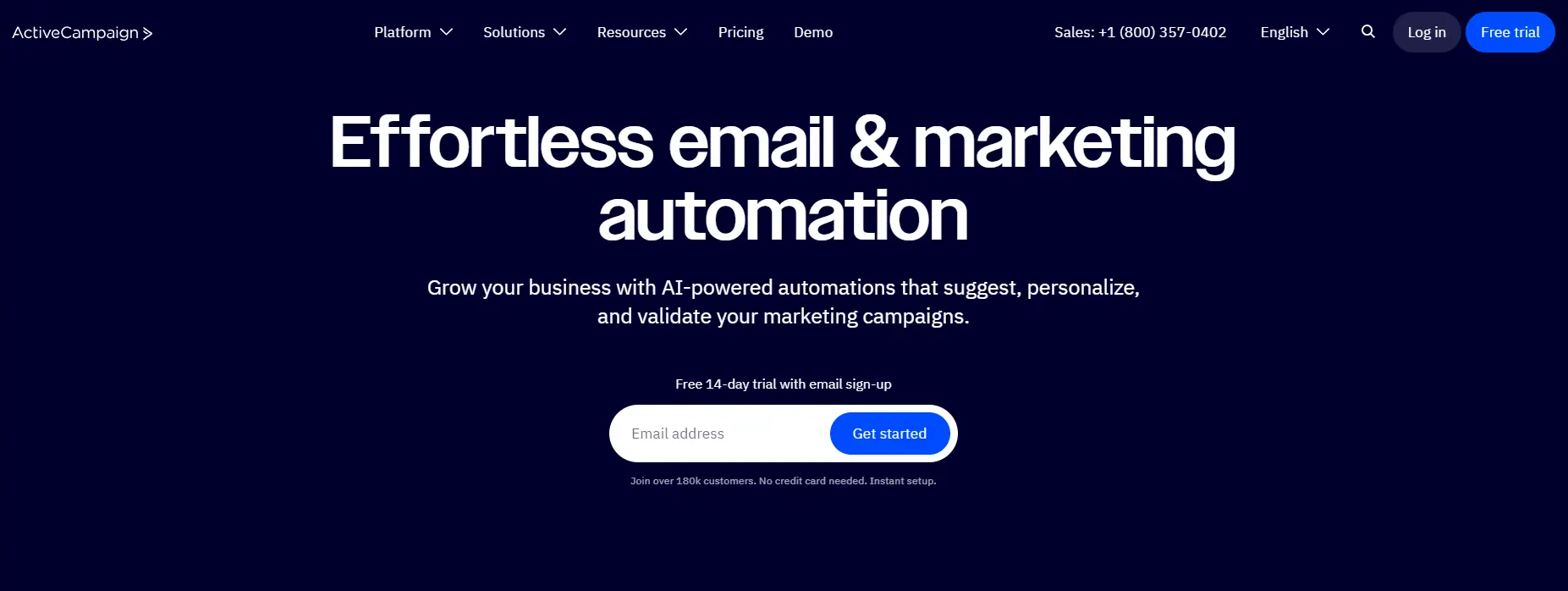
ActiveCampaign is a powerful marketing automation platform with a strong emphasis on email marketing automation and customer engagement. It’s ideal for sales and marketing teams looking to enhance their customer journey through personalized communication.
Key Features:
- Advanced email marketing tools with segmentation and personalization.
- Tools for creating automated workflows to automate repetitive tasks.
- Integration with over 850 apps, including e-commerce platforms.
- Detailed insights into customer behavior and engagement.
Pricing:
ActiveCampaign offers tiered pricing, starting with a free trial, and is scalable for businesses of all sizes.
Best For:
- Teams focused on advanced marketing automation tools.
- Businesses wanting to improve their customer segmentation and engagement.
- Organizations needing powerful tools for email marketing and workflow automation.
Why Choose ActiveCampaign?
ActiveCampaign’s rich marketing features and focus on automation make it a standout for teams aiming to deliver targeted campaigns and boost conversions.
10. Nutshell CRM
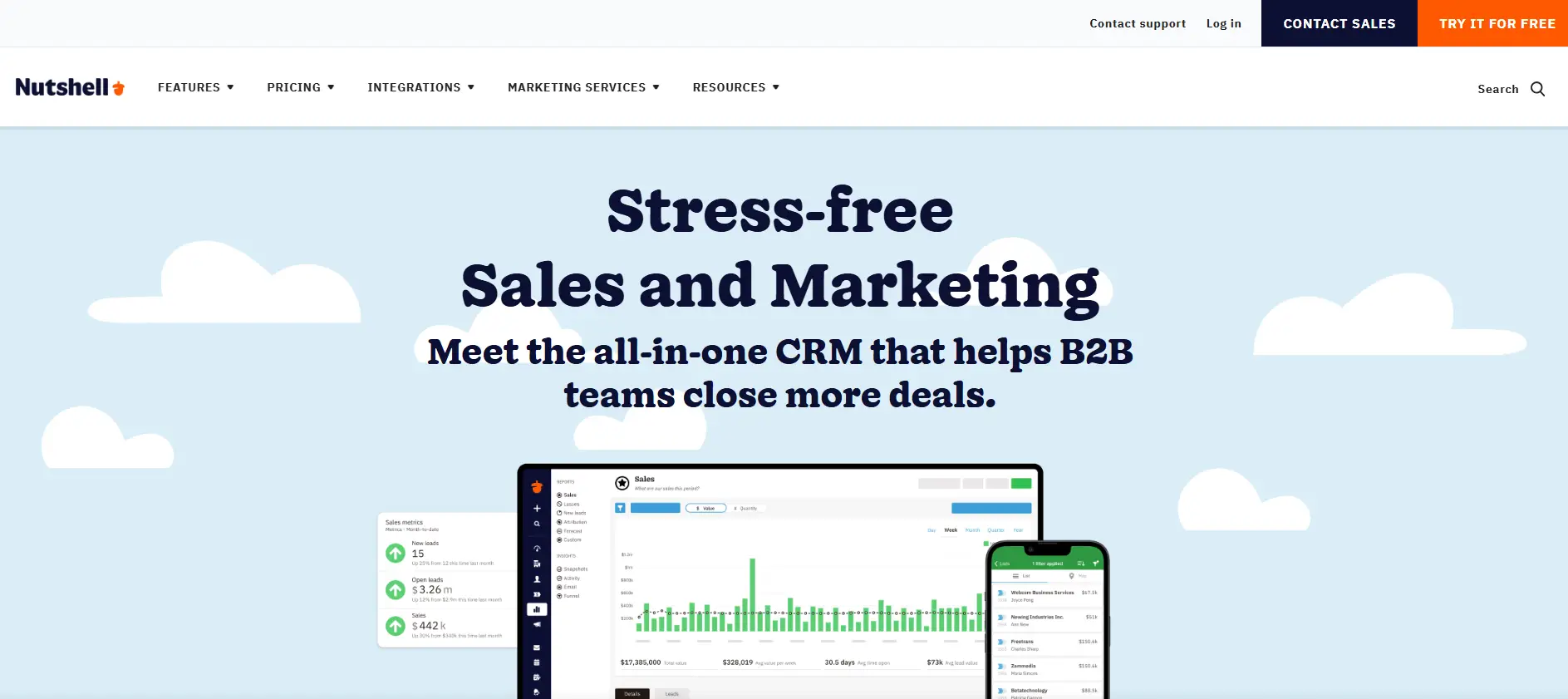
Nutshell CRM is a user-friendly option tailored for sales teams and small businesses. It focuses on providing intuitive tools for managing the sales pipeline and tracking customer data efficiently.
Key Features:
- Simple tools for sales pipeline management.
- Built-in email marketing automation capabilities.
- Reporting features for analyzing customer behavior and team performance.
- Integration with popular tools for seamless workflows.
Pricing:
Nutshell CRM offers affordable pricing plans with a free trial, making it accessible for growing teams.
Best For:
- Small businesses looking for an easy-to-use CRM solution.
- Sales teams manage their pipeline and tasks effectively.
- Teams needing an affordable and straightforward tool for business processes.
Why Choose Nutshell CRM?
With its focus on simplicity and core automation features, Nutshell CRM is an excellent choice for businesses that value ease of use and efficiency.
11. Bitrix24
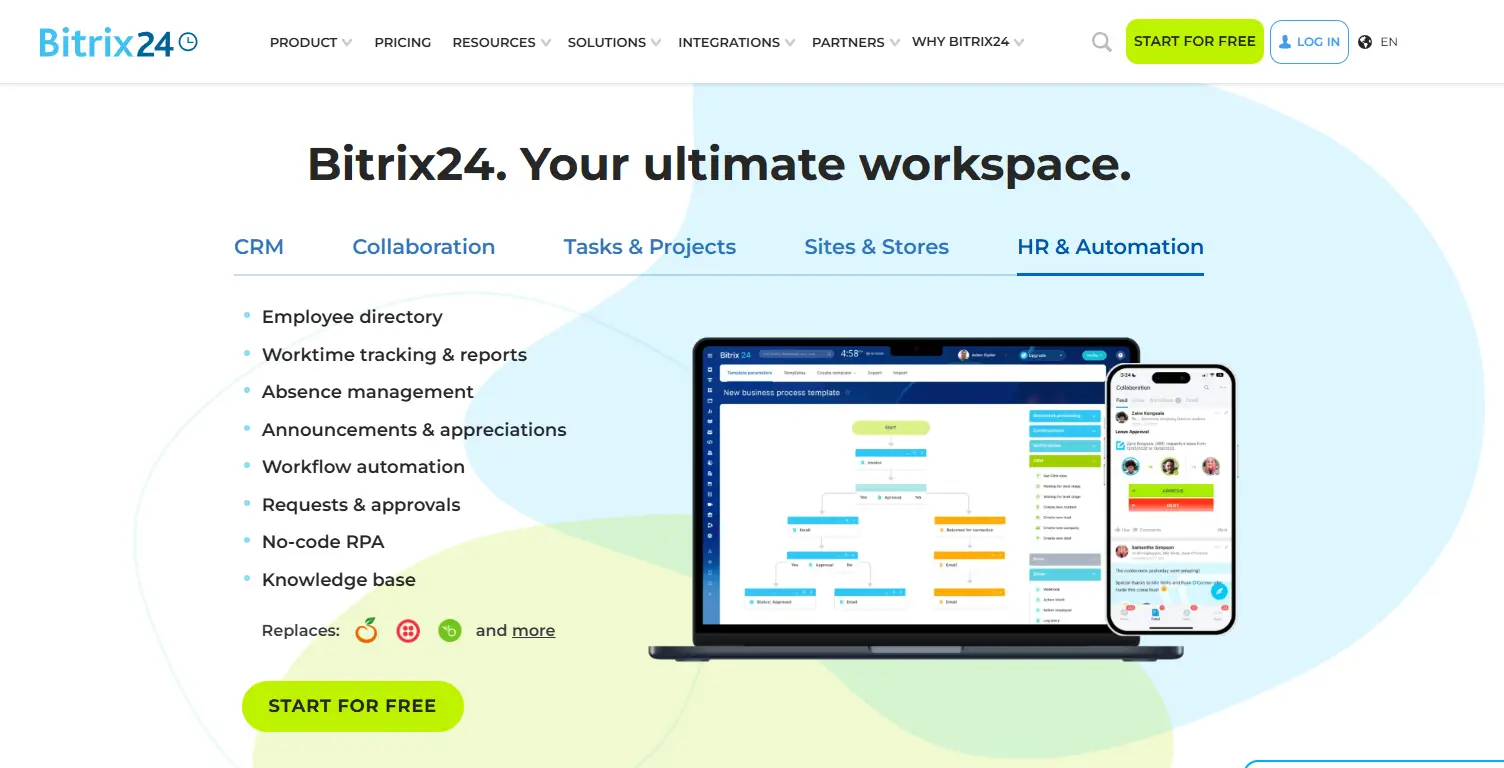
Bitrix24 is an all-in-one platform offering a range of tools for sales and marketing teams, as well as customer support. Its comprehensive feature set includes tools for collaboration, communication, and workflow automation.
Key Features:
- Built-in tools for task management and team collaboration.
- Tools to automate processes like sales pipeline management.
- Comprehensive reporting and analytics features.
- Integration with third-party apps for additional functionality.
Pricing:
Bitrix24 offers a free plan with essential features and scalable paid options for larger teams.
Best For:
- Businesses seeking an all-in-one platform for CRM and team collaboration.
- Teams needing robust workflow automation and reporting capabilities.
- Organizations that value an integrated tool for managing sales and marketing processes.
Why Choose Bitrix24?
Bitrix24 combines collaboration tools with CRM software, making it ideal for businesses looking to improve team efficiency and customer management simultaneously.
How to Choose the Right CRM
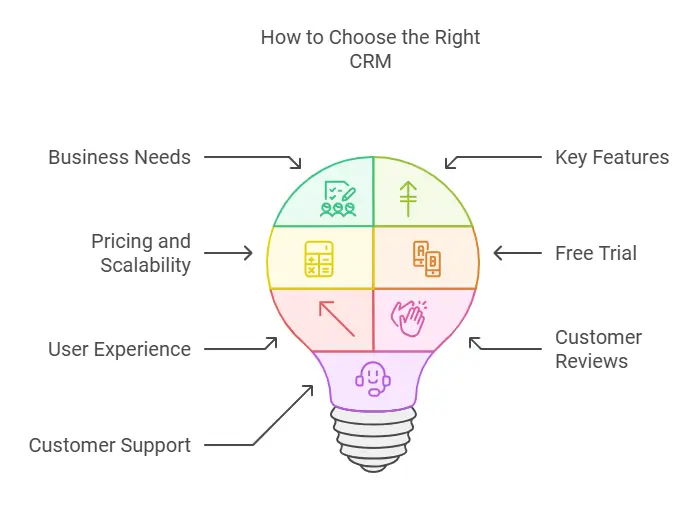
Selecting the right CRM solution is a critical decision that depends on your team’s specific needs, goals, and budget. Here’s a step-by-step guide to help narrow down your options:
1. Understand Your Business Needs
Identify the challenges you’re looking to solve. Whether it’s sales pipeline management, improving customer support, or automating marketing tasks, knowing your priorities will guide your decision. For example:
- Sales teams may prioritize tools for managing leads and tracking sales pipelines.
- Marketing teams may focus on email marketing automation and campaign tracking.
- Small businesses may look for an affordable CRM with a free plan or free trial.
2. Evaluate Key Features
List the essential features your team needs. Look for tools that offer:
- Automation features like workflow automation and task management.
- Reporting and analytics features to track performance and customer behavior.
- Integration with existing email marketing tools, social media marketing platforms, or other systems.
- A user-friendly interface that minimizes the steep learning curve.
3. Consider Pricing and Scalability
Budget is often a deciding factor for small businesses and SMBs. Assess the cost of each platform based on your team size and future growth:
- Does it offer a free plan or an affordable entry-level tier?
- Are there hidden costs for add-ons or extra users?
- Can the tool scale as your team grows?
4. Test with a Free Trial
Most HubSpot competitors offer a free trial. Use this opportunity to explore:
- How well the platform meets your business processes.
- Whether it supports your team’s sales and marketing workflows.
- The quality of customer support during onboarding.
5. Prioritize User Experience
A great HubSpot CRM alternative should offer an intuitive interface that simplifies daily tasks. Platforms with drag-and-drop functionality or customizable templates often save time and improve productivity.
6. Check Customer Reviews and Case Studies
Look for real-world feedback from teams like yours. Reviews often reveal insights about automation features, ease of use, and the platform’s reliability.
7. Ensure Strong Customer Support
Reliable customer support can make a significant difference, especially during setup or troubleshooting. Look for platforms with:
- 24/7 assistance.
- A dedicated account manager.
- Comprehensive guides and resources.
By focusing on these factors, you’ll be better equipped to choose a CRM software that aligns with your goals and improves team efficiency.
Conclusion
Finding the perfect HubSpot alternative depends on your unique business needs and priorities. Whether you’re looking for advanced marketing automation tools, streamlined sales pipeline management, or a user-friendly CRM solution, the options we’ve covered have something to offer.
Desku, for instance, stands out as a top choice for customer support teams, while tools like Zoho CRM and Pipedrive excel in sales and marketing automation. Platforms such as ActiveCampaign and Keap shine for businesses seeking robust email marketing automation and personalized engagement.
When choosing a CRM, remember to:
- Focus on the key features that align with your goals.
- Consider the platform’s pricing and scalability.
- Test potential tools with a free trial to see how they work for your team.
The right CRM can transform your workflows, automate repetitive tasks, and improve customer satisfaction. Take the time to evaluate your options carefully, and you’ll find a solution that fits seamlessly into your team’s processes while driving growth.
FAQs
1. What is the best alternative to HubSpot for small businesses?
The best HubSpot alternative for small businesses depends on their specific needs. Zoho CRM is a strong option for its affordability and robust automation features, while Desku is ideal for small teams focused on customer support. For an all-in-one tool with a free plan, consider Bitrix24.
2. Which CRM has the best automation features?
For advanced marketing automation and sales automation, ActiveCampaign and Keap stand out. Both platforms offer tools to automate email marketing, manage sales pipelines, and personalize campaigns based on customer behavior.
3. Are there any free HubSpot CRM alternatives?
Yes, several platforms offer a free plan or free trial. Examples include:
Zoho CRM: Free for small teams.
Bitrix24: Comprehensive features in its free tier.
Freshsales: Free plan for basic CRM needs.
4. How do I choose the right CRM for my team?
Start by identifying your goals—whether it’s improving sales pipelines, automating marketing campaigns, or enhancing customer support. Then, test platforms with a free trial, evaluate their user interface, and ensure they fit your budget.
5. What makes Desku a great HubSpot alternative?
Desku offers powerful tools for managing customer support platforms, task management, and workflow automation. It is particularly effective for teams seeking a comprehensive CRM solution that’s simple to use and affordable.
6. Can CRM software help automate repetitive tasks?
Yes, most modern CRM tools include features to automate repetitive tasks, like sending follow-up emails, tracking leads, and managing workflows. This helps teams save time and focus on strategy.
- About the Author
- Latest Posts
Gaurav Nagani was the Founder of Desku, an AI-powered customer service software platform.
- Email Management: Best Strategies, Tools & Tips for SaaS and Ecommerce
- Shared Inbox Guide: Definition, Benefits, Tools & Best Practices 2025
- LivePerson Pricing Exposed: What They Don’t Show You on Their Website
- Automate Customer Support with AI A Practical Guide
- Desku vs UsePylon: Which One Scales Better for Startups?


